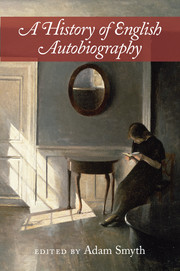Book contents
- Frontmatter
- Dedication
- Contents
- List of contributors
- 1 Introduction: The range, limits, and potentials of the form
- PART 1 AUTOBIOGRAPHY BEFORE ‘AUTOBIOGRAPHY’ (CA. 1300–1700)
- PART 2 RELIGION, GENDER, THINGS (CA. 1700–1800)
- PART 3 THE MANY NINETEENTH CENTURIES (CA. 1800–1900)
- PART 4 RELATIONAL LIVES AND FORMS OF REMEMBERING (CA. 1890–1930)
- PART 5 KINDS OF COMMUNITY (CA. 1930-CONTEMPORARY)
- 23 Poetry and autobiography in the 1930s: Auden, Isherwood, MacNeice, Spender
- 24 Documenting lives: Mass Observation, women's diaries, and everyday modernity
- 25 Postcolonial autobiography in English: The example of Trinidad
- 26 Around 2000: Memoir as literature
- 27 Illness narratives
- 28 Breaking the pact: Contemporary autobiographical diversions
- 29 The machines that write us: Social media and the evolution of the autobiographical impulse
- Index
- References
26 - Around 2000: Memoir as literature
from PART 5 - KINDS OF COMMUNITY (CA. 1930-CONTEMPORARY)
Published online by Cambridge University Press: 05 March 2016
- Frontmatter
- Dedication
- Contents
- List of contributors
- 1 Introduction: The range, limits, and potentials of the form
- PART 1 AUTOBIOGRAPHY BEFORE ‘AUTOBIOGRAPHY’ (CA. 1300–1700)
- PART 2 RELIGION, GENDER, THINGS (CA. 1700–1800)
- PART 3 THE MANY NINETEENTH CENTURIES (CA. 1800–1900)
- PART 4 RELATIONAL LIVES AND FORMS OF REMEMBERING (CA. 1890–1930)
- PART 5 KINDS OF COMMUNITY (CA. 1930-CONTEMPORARY)
- 23 Poetry and autobiography in the 1930s: Auden, Isherwood, MacNeice, Spender
- 24 Documenting lives: Mass Observation, women's diaries, and everyday modernity
- 25 Postcolonial autobiography in English: The example of Trinidad
- 26 Around 2000: Memoir as literature
- 27 Illness narratives
- 28 Breaking the pact: Contemporary autobiographical diversions
- 29 The machines that write us: Social media and the evolution of the autobiographical impulse
- Index
- References
Summary
[W]hat everyone has in them, these days, is not a novel but a memoir.
Martin Amis, Experience (2000, 6)Perhaps everyone has a memoir in them. But can everyone get it out? A memoir requires memory and experience. It also requires writing. Those who are known for their writing thus seem qualified for the genre. They provide the subject of the present chapter: the recent history of the literary memoir. That term can be understood in terms both of provenance (the memoir of the writer, the person from the world of literature) and of form (the memoir as literary art). A working assumption is that the two senses connect: the practising, and practised, writer is the most likely to produce a memoir that might be deemed literature.
But the literary memoir also raises an immediate paradox. Writers may be the best qualified to write memoir, but they may also be among the last people who should write it, as their lives have been composed primarily of writing. Henry James thematised this very duality in the uncanny story ‘The Private Life’ (1891), where a writer needs one self to live and another to write. In modern autobiography, this corresponds to the actual practice of ghostwriting. The self who has experienced but cannot write can be voiced through the conduit of the self who has not had the experiences, but has the craft to convey them.
Some writers resolve this issue through having specific, exceptional bouts of experience which are worth recounting. Exemplary here is Salman Rushdie, whose Joseph Anton (2012) centres on his uniquely dramatic experience of hiding from assassins. More common is the production of a memoir that centres heavily on the early years before the writer truly became a writer: years that may be formative and are also, in effect, pre-literary. Thus the first half of J. G. Ballard's Miracles of Life (2008) is devoted to his upbringing in Shanghai, and John McGahern's Memoir (2005) is largely ‘the story of my upbringing, the people who brought me up, my parents and those around them, in their time and landscape’ (McGahern 2005, 260). More specifically, a memoir may explore a particular trouble in the writer's past or family.
- Type
- Chapter
- Information
- A History of English Autobiography , pp. 374 - 387Publisher: Cambridge University PressPrint publication year: 2016



